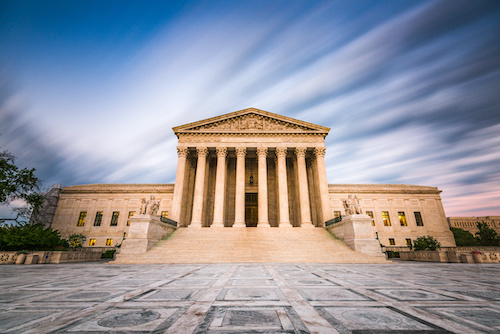Liquidia Urges SCOTUS to Restore Preclusive Effect to PTAB Final Written Decisions
“Had this case been decided by another circuit… basic principles of issue preclusion would have allowed the PTAB’s decision to block UTC’s induced infringement claim.” – Petitioner Liquidia Technologies
Last week, biopharmaceutical company Liquidia Technologies filed a petition for writ of certiorari with the U.S. Supreme Court to appeal a Federal Circuit ruling that affirmed induced infringement findings against Liquidia following the patent at issue being invalidated at the Patent Trial and Appeal Board (PTAB). In the petition, Liquidia argues that two previous Supreme Court rulings lead to a result contrary to the Federal Circuit’s determination that the invalidation of patent claims at the PTAB do not have preclusive effect on infringement litigation pending an appeal of the PTAB’s decision.
Federal Circuit Affirms Induced Infringement Before Affirming Patent Invalidation
The present appeal stems from competing New Drug Applications (NDAs) filed at the U.S. Food & Drug Administration by Liquidia and respondent patent owner United Therapeutics Corporation (UTC). Both NDAs cover methods of treating pulmonary artery hypertension with inhaled formulations of treprostinil, which Liquidia sells as Yutrepia and UTC sells as Tyvaso. UTC filed a patent infringement suit in Delaware district court in June 2020 and while Liquidia raised invalidity defenses in district court, it also filed for inter partes review (IPR) proceedings at the PTAB to challenge UTC’s U.S. Patent No. 10716793, Treprostinil Administration by Inhalation.
After the PTAB invalidated all challenged claims of the ‘793 patent in Liquidia’s IPR, the Delaware district court issued a ruling affirming both the validity of the ‘793 patent’s claims and the jury’s induced infringement finding against Liquidia. Liquidia appealed to the U.S. Court of Appeals for the Federal Circuit, which issued a decision last July agreeing with the district court that the PTAB’s invalidation of the ‘793 patent’s claims did not take preclusive effect while UTC’s appeal of the final written decision was pending. Then last December, the Federal Circuit affirmed the PTAB’s final written decision in the IPR invalidating UTC’s ‘793 patent claims.
Liquidia’s cert petition warns that grave consequences, including the destabilization of the IPR process by meritless appeals, will stem from the Federal Circuit’s decision to affirm the induced infringement finding in favor of UTC. The petitioner also notes that the ruling’s impacts are not limited to patent law and could allow a person to remove any preclusive effect from any federal agency ruling by filing an appeal.
Commil, B&B Hardware Confirm That Preclusive Effect Should Apply
Two recent Supreme Court decisions should compel the Court to nix the induced infringement ruling against Liquidia, the petition argues. The first of these is Commil USA v. Cisco (2015). Although Commil held that subjective belief in a patent’s invalidity was not a defense to induced infringement, the Court’s ruling stated: “To be sure, if at the end of the day, an act that would have been… an inducement to infringe pertains to a patent that is shown to be invalid, there is no patent to be infringed.” Liquidia’s petition contends that Commil’s ruling is expressly grounded in the PTAB’s statutory framework and ultimately “held what is dispositive here, ‘accused inducers who believe a patent is invalid have various proper ways to obtain a ruling to that effect.’” Seeking an invalidity ruling through IPR proceedings at the PTAB is precisely what the Supreme Court told parties avoiding infringement liability in Commil, Liquidia reasons.
Although B&B Hardware v. Hargis Industries (2015) dealt with a trademark ruling appealed from the Trademark Trial and Appeal Board (TTAB), the Court analyzed its own prior decisions and the Restatement (Second) of Judgments before stating that “where a single issue is before a court and an administrative agency, preclusion also often applies.” Under that reasoning, the Court found that the TTAB’s likelihood of confusion findings had preclusive effect on trademark infringement litigation in district court. In B&B Hardware, the Court looked for but found no evident statutory purpose removing preclusive effect from TTAB rulings, “just as the Court itself did in Commil,” Liquidia argues. Following B&B Hardware, U.S. district courts and the Federal Circuit itself have ruled that TTAB and PTAB proceedings are nearly indistinguishable for purposes of issue preclusion.
Exclusive Jurisdiction for Patent Appeals Means Issue Unlikely to Percolate Elsewhere
Under ordinary rules of res judicata, or issue preclusion, final judgments of lower tribunals are given preclusive effect despite the pendency of an appeal. “Every single circuit follows this rule as to lower court rulings,” Liquidia contends. By contrast, the petitioner cites several examples of lower courts expressing confusion as to the Federal Circuit’s rulings on the preclusive effect of IPR rulings when an appeal is pending. “Had this case been decided by another circuit—which it could not have been, given the Federal Circuit’s exclusive jurisdiction—basic principles of issue preclusion would have allowed the PTAB’s decision to block UTC’s induced infringement claim,” Liquidia argues.
Nothing in the text of the America Invents Act (AIA) provides any evident Congressional intent to foreclose the normal operation of preclusion law in IPR proceedings, Liquidia concludes. Generally, courts favor administrative estoppel, and estoppel provisions like those codified at 35 U.S.C. § 315(e)(2) reflect that Congress intended PTAB final written decisions to have preclusive effect on civil actions in U.S. district court. Requiring petitioners to include all potential invalidity arguments in an IPR petition or risk waiving those arguments in district court only amplifies Congressional intent that preclusive effect would apply, according to Liquidia.
“[A]s a practical matter, the Federal Circuit’s decision in this case means that hundreds of invalidity determinations by the PTAB each year will be denied the preclusive effects Congress intended to give them,” Liquidia’s petition states. Further percolation of his issue in other circuit courts is unnecessary, Liquidia argues, as patent appeals in regional courts of appeal are extremely rare.
Image rights acquired by AdobeStock
Steve Brachmann
Steve Brachmann is a graduate of the University at Buffalo School of Law, having earned his Juris Doctor in May 2022 and served as the President of the Intellectual Property […see more]






